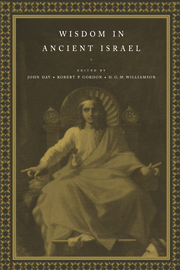Book contents
- Frontmatter
- Contents
- List of abbreviations
- Introduction
- Part 1 The ancient near eastern setting
- Part 2 Old Testament and Apocryphal texts
- 4 Foreign Semitic influence on the wisdom of Israel and its appropriation in the book of Proverbs
- 5 The limits of theodicy as a theme of the book of Job
- 6 Qoheleth
- 7 A house divided: wisdom in Old Testament narrative traditions
- 8 Wisdom in Solomonic historiography
- 9 Amos and wisdom
- 10 Hosea and the wisdom tradition: dependence and independence
- 11 Isaiah and the wise
- 12 Jeremiah and the wise
- 13 The wisdom psalms
- 14 Wisdom and Daniel
- 15 Ecclesiasticus: a tract for the times
- 16 The Christian use and the Jewish origins of the Wisdom of Solomon
- Part 3 Themes
- Biographical note: John Adney Emerton
- Bibliography of the works of John Adney Emerton
- Indexes
- Principal biblical and apocryphal references
12 - Jeremiah and the wise
Published online by Cambridge University Press: 16 October 2009
- Frontmatter
- Contents
- List of abbreviations
- Introduction
- Part 1 The ancient near eastern setting
- Part 2 Old Testament and Apocryphal texts
- 4 Foreign Semitic influence on the wisdom of Israel and its appropriation in the book of Proverbs
- 5 The limits of theodicy as a theme of the book of Job
- 6 Qoheleth
- 7 A house divided: wisdom in Old Testament narrative traditions
- 8 Wisdom in Solomonic historiography
- 9 Amos and wisdom
- 10 Hosea and the wisdom tradition: dependence and independence
- 11 Isaiah and the wise
- 12 Jeremiah and the wise
- 13 The wisdom psalms
- 14 Wisdom and Daniel
- 15 Ecclesiasticus: a tract for the times
- 16 The Christian use and the Jewish origins of the Wisdom of Solomon
- Part 3 Themes
- Biographical note: John Adney Emerton
- Bibliography of the works of John Adney Emerton
- Indexes
- Principal biblical and apocryphal references
Summary
The wise against whom the pre-exilic Judahite prophets conducted a polemic were statesmen in the service of the kings of Judah on whose expertise and sagacity ('ēṣâ) the kings relied for advice and policy. The book of Jeremiah contains chapters which set out Jeremiah's conflict with both kings and statesmen, especially on a matter of foreign policy, namely the kind of response which should be made to the imperial ambitions of Nebuchadrezzar.
The ‘princes’ or ‘counsellors’ as statesmen are certainly one class of the ‘wise’ or ‘scribes’, but they do not exhaust the class, and one (viii 8–9) or perhaps two (ii 8) passages in the book of Jeremiah refer to ‘wise’ or ‘scribes’ who are Torah-scholars and specialize in the interpretation of the law. The ‘wise’ were an educated class equipped for different professions, and so their pursuits might be religious or literary (Proverbs) rather than political. Why bray expressed doubt about the attempt to turn ‘wise’ into a class title, but the antithesis which the pre-exilic prophets construct between ‘word’ and ‘counsel’, between the revealed word and the concerting of policy by specialists, makes it clear that they are directing their criticism against a claim to know-how and sagacity and are opposing it with a prophetic claim. It is the prophet informed by Yahweh who is the authentic source of the policy which Judah should follow.
- Type
- Chapter
- Information
- Wisdom in Ancient Israel , pp. 142 - 151Publisher: Cambridge University PressPrint publication year: 1995

